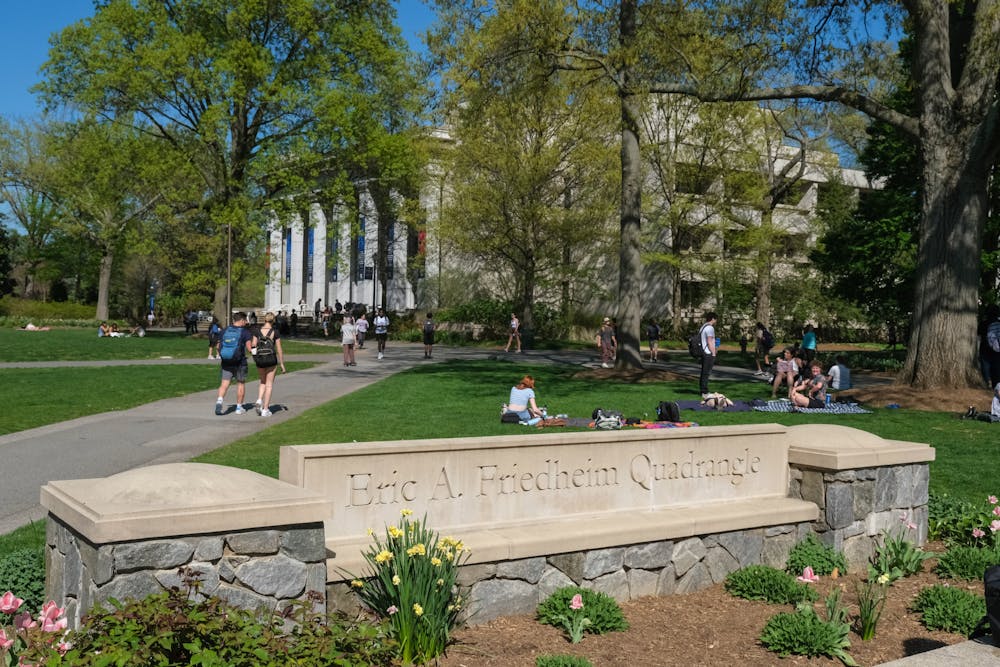From the Newsstands: This story appeared in The Eagle's December 2024 print edition. You can find the digital version here.
As American University’s administration contends with how to create policies to prevent antisemitism and Islamophobia on campus, students and faculty call for the protection of free speech and the equal treatment of all student groups.
Since the Oct. 7 attacks last year, AU has become one of many universities challenged with how to balance protests and differing responses to the Israel-Hamas war. According to data from the FBI, antisemitism and Islamophobia have both risen at unprecedented rates and hate crimes have doubled since 2014.
“There’s a lot of division right now, it can be really hard to connect and to have those conversations,” said Nkenge Friday, vice president of inclusive excellence. “There’s fear from some of our students, from our faculty, staff and even some administrators.”
Administrative actions and student and faculty responses
Antisemitism especially has become a concern on campus, as approximately 20 percent of the University’s student body is Jewish, according to AU Hillel. According to Friday, there are also counts of Muslim students on campus, although they are not publicly available, as she said both populations are difficult to accurately identify.
Kasey Bernat, a sophomore in the School of International Service and a senator-at-large, said he thinks the University’s response to any kind of antisemitism and Islamophobia on campus has been “incredibly poor” and a “disservice to Jewish students, Muslim students and any other communities.”
As a means to address the University’s inaction, Bernat and former Senator- at-Large Connor Thompson worked to pass Resolution 19-020 this fall with the goal of addressing antisemitism as a systemic campus issue but also “to signal to the Jewish community on campus that we did want to work with them to solve problems that were deeply personal to them,” according to Thompson.
Kaden Ouimet, a sophomore in SPA, senator-at-large and an executive board member of the Muslim Student Association said he has been severely disappointed by the Univer- sity’s response to both antisemitism and Islamophobia.
“That students are not able to publicly read the names of murdered children without a militarized police response reveals the extent to which the administration is deadset on repressing free speech,” said Kirstie Dorr, an associate professor in critical race, gender and culture studies about an Oct. 7 vigil hosted by Students for Justice in Palestine, where students were confronted on the quad the by the AU Police Department equipped with zip ties.
The Senate has also called on the University to divest from and boycott Israeli-owned or associated companies with the CONDOR Resolution, as a part of a wider boycott, divestment and sanctions movement to “end international support for Israel’s oppression of Palestinians.”
Ouimet, co-author of the resolution, said the University must begin to engage in divestment and “understand that their continued complicity in what’s going on in Palestine is having a direct tie on what’s happening here on campus.”
Ethan Kassar, vice president of AU’s chapter of Students Supporting Israel, said the BDS movement upholds Israel to a different standard than other countries.
Kassar said he wished that the University would do more to prevent hate speech at the start of the semester but in the past month he has seen improvements, as he feels university policies are now being applied equally.
Friday said she understands disappointment surrounding University policy and is trying to involve more student perspectives as the University moves forward under President Jonathan Alger.
In the past year, The Office of Inclusive Excellence created a Climate Action Response Team, made up of students and faculty to try and better inform policy making. The office has worked with Title IX to appoint student ambassadors to oversee claims related to discrimination.
“We support our community’s commitment to local, national and global issues, and we encourage them to use their voices and express their beliefs by marching, protesting and engaging in civil dialogue,” said Elizabeth Deal, assistant vice president and deputy chief communications officer in a statement to The Eagle.
Deal also emphasized its responsibility to balance freedom of expression with student safety concerns, saying organizations “must not disrupt the operations of the University” or result in the “discrimination against or the intimidation or harassment” of any groups or individuals.
Jason Benkendorf, the director of AU Hillel, said that although there is still work to be done, he thinks the administration has responded accordingly to protests and antisemitism.
“I appreciate that the administration has been engaged around these issues and has listened to Jewish students when they share the challenging experiences that they’re having on campus,” Benkendorf said.
In the future, Friday said she “foresees more listening sessions, more updates and perhaps a lot more work” to better meet students’ needs during this conflict.
It is essential that colleges like AU work to fight both antisemitism and Islamophobia simultaneously when creating policy, said Joshua Shanes, a professor at the College of Charleston and co-author of the Nexus campus climate guide.
“You can’t fight antisemitism without fighting Islamophobia and other forms of racism and vice versa,” Shanes said. “It’s really unfortunate when I see these things dividing minority communities because it's only by alliances that these things can more effectively be battled.”
Michael Brenner, director of the Center for Israel Studies, said moving forward there must be more dialogue between different groups on campus.
“How can we expect Israelis and Palestinians to speak to each other internationally if we can’t even do that on our own campus?” Brenner said.
Correction: The print version of this article misspelled Kirstie Dorr’s first name. It has been updated to reflect the correct spelling.
This article was edited by Olivia Wood, Maya Cederlund, Tyler Davis and Abigail Turner. Copy editing done by Luna Jinks, Emma Brown, Sabine Kanter-Huchting, Ariana Kavoossi, Ella Rousseau, Nicole Kariuki and Charlie Mennuti. Fact checking done by Hannah Paisley Zoulek and Sasha Dafkova.





